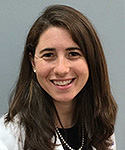November 19th, 2020
Where DO We Go from Here? Being an Osteopathic Physician in 2020
Stephanie Braunthal, DO
The latter portion of 2020 has brought forth an unfortunate series of comments in the news, on social media, and even in the ad of a fashionable scrub company that called into question the credibility of DOs to practice medicine and surgery and to serve as public health experts. As a proud graduate of an osteopathic medical school and who, as of this past month, is officially an ABIM-certified internist, the attacks are frustrating, but unfortunately not entirely unfamiliar. Many of us, regardless of how specialized we become, at some point over the course of our careers find ourselves explaining or justifying our credentials to patients, peers, and mentors who are less familiar with our degree. While no opinion is universally held within the medical community, some of my MD colleagues admit to previous biases against DOs, which abated as soon as they worked with them as colleagues or taught them as medical students and residents. It is for this reason that increased representation matters, particularly at an unprecedented time when conspiracy theorists will use any means possible to question the integrity of medical professionals.
2020 also marks a momentous milestone in graduate medical education: the completion of the ACGME single accreditation process, a five year endeavor which consolidated the governance of previously osteopathic and allopathic training programs. Osteopathic medical students no longer have to choose between residency matches (the American Osteopathic Association-affiliated programs previously had a separate match), and allopathic candidates can now apply to programs that were previously limited to osteopathic alumni. Training MDs and DOs side-by-side will thus become increasingly common. My hope is that normalizing the heterogeneity of trainees will not only lead to further promotion and publication of osteopathic physicians, it will also engender more subtle nods to our parity. Examples include removing the expectation that DO students need to gratuitously sit for the USMLE in addition to their COMLEX-USA licensing exams, or even evolving expressions such as “MD aware” to include DOs.
 Thank you to everyone reading who rallied to the defense of DOs as we were misrepresented over the past few months. As we approach the 2021 recruitment season, I implore you to take your support a step further. Reflect on whether your institution regularly welcomes residents, fellows, and faculty who graduated from osteopathic medical schools, and if it does not, please consider these candidates for your program. We are competent, compassionate, and ambitious physicians, whose additional training in manipulative medicine gives us a unique perspective on prevention and ways to conservatively augment care. When given the opportunities, we rise to leadership positions and make significant contributions to our fields, mentoring our allopathic and osteopathic contemporaries along the way. So, hire us. The more we are included, the more we all succeed.
Thank you to everyone reading who rallied to the defense of DOs as we were misrepresented over the past few months. As we approach the 2021 recruitment season, I implore you to take your support a step further. Reflect on whether your institution regularly welcomes residents, fellows, and faculty who graduated from osteopathic medical schools, and if it does not, please consider these candidates for your program. We are competent, compassionate, and ambitious physicians, whose additional training in manipulative medicine gives us a unique perspective on prevention and ways to conservatively augment care. When given the opportunities, we rise to leadership positions and make significant contributions to our fields, mentoring our allopathic and osteopathic contemporaries along the way. So, hire us. The more we are included, the more we all succeed.




As another proud DO, the above comments are absolutely true. Thanks for bringing up several of the points regarding parity between DO and MD physicians. Having graduated from a program with a mix of DOs and MDs, there were many strong physicians on both sides of the degree spectrum. At a time of extra division in our country, there isn’t a need to have it in medicine where we have many other more useful battles to participate in.
Agree, thank you for your kind words.
Well written commentary, Dr. Braunthal. After practicing Osteopathic Medicine for 30 years in Michigan and another 10 years in California, I am SO TIRED of this ignorance. Congratulations on your accomplishments. I share your fatigue and frustration about this never-ending prejudice simply due to the fact that we are female and Osteopathic Physicians.
Dr. Rehfield, thank you for your kind words. Between agree that the combo can become particularly exhausting, but I take solace in knowing that we are open to talking about it more. I feel honored I was able to share it here and spark this discussion.
Many of the most esteemed providers/ medical leaders in our community and also in the state are DO Physician’s. More often patient preferred and successful. We are a state that ranks in the highest quartile for quality medical care- Iowa. Very proud, thankful for our osteopathic training. Sincerely
Thank you! It is always empowering to see other DOs hold leadership positions.
Stephanie, I commend you on such a well written and succinct response to an assault on our credentials and training. I would love to share my experiences with you as a graduate from KCCOM in 1980, and my training at the University of Wisconsin-Madison in both internal medicine and cardiology. Good luck to you during this trying time and stay safe and healthy!
Hi Dr. Hustead, thank you! Please feel free to connect with me @sgbraunthal on Twitter. Would love to hear your experiences. Good luck to you as well during these trying times.
Well said Stephanie. Over 40% of the staff at Cleveland Clinic are DOs! We have a medical school associated with Cleveland clinic ( Ohio Univerity Heritage College of Osteopathic Medicine) DO you think they would associate with our profession if they didn’t have confidence in the qualty of the Doctors they were producing. Honestly, we really don’t have to prove ourselves. Our actions/ abilities speak for themselves!
Dr. Harris, it has been an honor to train there, and I enjoy working with the OUHCOM med students on the floors!
Don’t let ignorance sway your course.The Intelligent and informed consider DO/MD ‘s as Peers and equally invaluable to society. All physicians have referred to…been taught by,,,been treated by,,,,have emulated… a DO at some point in their career often unknowingly.
Thank you for your kind and empowering words, Dr. Daly.
Yes- I plead absolute ignorance – even from another country. Where can I find the differences?
Hi Max, https://www.aacom.org/ is the official website for DO schools, which includes a section on the history of the field. Hope that helps!
Stephanie
I first learned of DOs by a hand surgeon who cared for me in undergrad. Excellent care followed by many DO fellow residents at Children’s Mercy Hospital. Thank you for your peice. The more the public encounters you in practice or in the media, the quicker the misconceptions shall abate.
Hi Dr. Reiser, thank you for your kind words. While I hope this can be one small step to make a difference, I’m nevertheless honored to have had the opportunity to share.
As a long term patient, and a credentialing specialist, I appreciate DOs and MDs so much. Thank you all for all that you do! As a patient, I personally prefer to have DOs mixed in with my medical care. And, trying to explain to people that differences and similarities between the two is quite difficult, they often think that DOs are not as educated as MDs. I thank all doctors though for your true dedication.
Thank you for your kind words, and for your work with credentialing! Definitely not an easy job, but imperative to us all.
Osteopathic physicians are now on the faculty of many allopathic medical schools. They teach a variety of standard medical school courses, Some include comments on osteopathic principles in their presentations. Has tne time come for a comprehensive overview course in osteopathic principles and practices be made available as a “regular” or an elective course in the curriculum of allopathic medical schools? MDs and DOs work together at the graduate level. Has the time come to do the same at the pre-doctoral level?
Dr. Goldstein, that’s an interesting thought. Do you propose combining degrees, creating a combination degree, or were you more thinking of this as more of a rotation elective?
Stephanie, thank you for shedding light on this issue. I have been trained by several DOs – competent, compassionate individuals! I witnessed them subject to degree-related biases from patients, which really broke my heart!